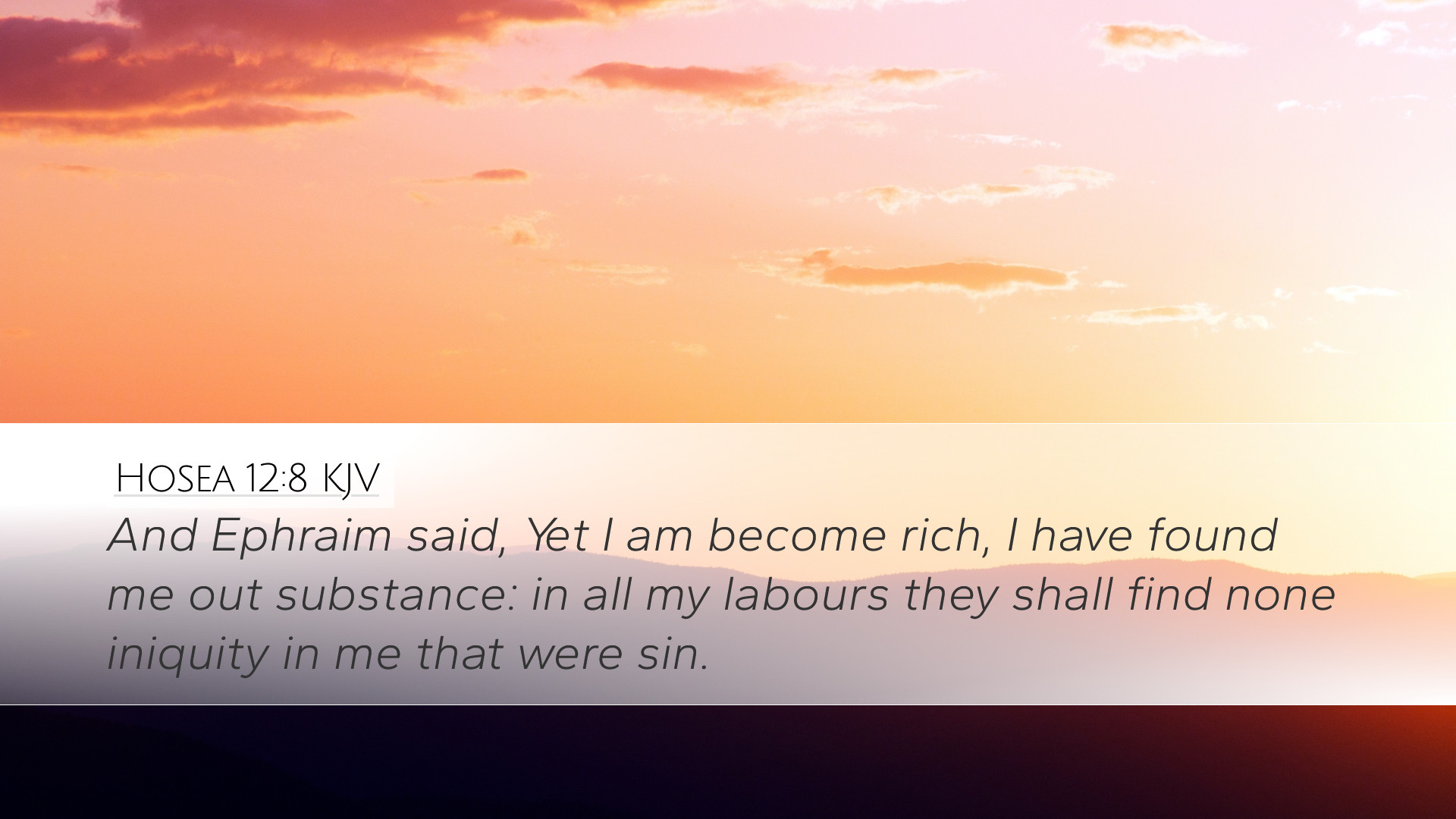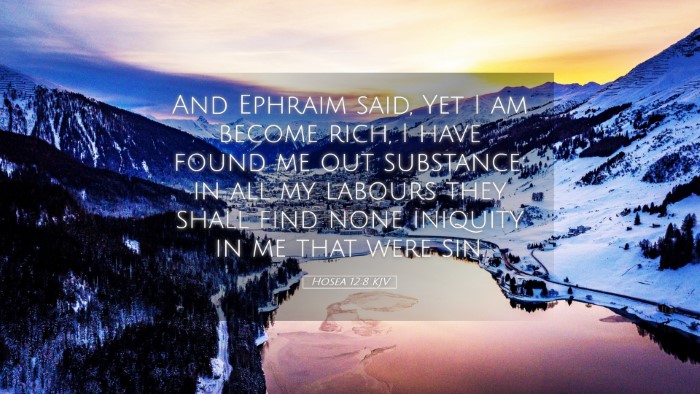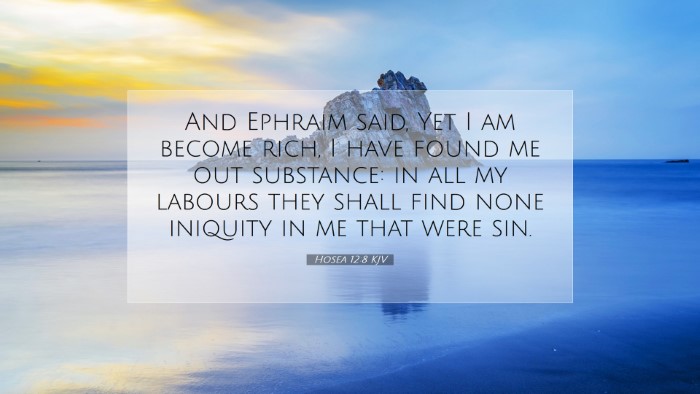Old Testament
Genesis Exodus Leviticus Numbers Deuteronomy Joshua Judges Ruth 1 Samuel 2 Samuel 1 Kings 2 Kings 1 Chronicles 2 Chronicles Ezra Nehemiah Esther Job Psalms Proverbs Ecclesiastes Song of Solomon Isaiah Jeremiah Lamentations Ezekiel Daniel Hosea Joel Amos Obadiah Jonah Micah Nahum Habakkuk Zephaniah Haggai Zechariah MalachiHosea 12:8
Hosea 12:8 KJV
And Ephraim said, Yet I am become rich, I have found me out substance: in all my labours they shall find none iniquity in me that were sin.
Hosea 12:8 Bible Commentary
Commentary on Hosea 12:8
Bible Verse: “And Ephraim said, Yet I am become rich, I have found me out substance: in all my labors they shall find none iniquity in me that were sin.” (Hosea 12:8)
Introduction
The verse Hosea 12:8 offers a profound insight into the spiritual and moral condition of Ephraim, the representative tribe of Israel. It reflects the state of pride and self-sufficiency that characterizes the people of God at this time. In analyzing this verse, we draw from the wisdom of renowned theologians and scriptural commentators such as Matthew Henry, Albert Barnes, and Adam Clarke.
Contextual Analysis
To fully appreciate the implications of Hosea 12:8, it is crucial to understand the backdrop against which this verse was written. Ephraim represents not merely the tribe but the entire northern kingdom of Israel, which was embroiled in a cycle of sin, idolatry, and moral decay. Hosea's prophetic ministry occurs in a time when prosperity often leads to spiritual decline, a recurring theme within the prophetic literature.
Matthew Henry's Insights
Matthew Henry expounds on the nature of pride and self-reliance that permeates Ephraim's statement. He points out that Ephraim's declaration of wealth and sufficiency reflects a deep-seated arrogance. Henry observes that rather than acknowledging their dependence on God, Ephraim boasts in their material gains and labor, failing to recognize the spiritual iniquity that accompanies their prosperity.
Henry also highlights the tragic irony that while Ephraim believes they are without sin, their own prosperity and self-satisfaction have led them away from God. He notes, “In all my labors they shall find none iniquity in me,” indicating a blindness to their spiritual state due to their material wealth.
Albert Barnes' Perspective
Albert Barnes further elaborates on the implications of Ephraim's claim of riches. He argues that this declaration signifies not only materialistic gain but a substantive spiritual delusion. Barnes suggests that it serves as a warning against the dangers of wealth and security that can lead to complacency and a false sense of righteousness.
He positions this verse as an indictment of the futility of trusting in material possessions. Barnes states, “Ephraim, in his abundance, considers himself secure, as if self-sufficient wealth could save him from God’s judgment.” This brings to light the biblical principle that true wealth is not found in tangible assets but in spiritual vitality and obedience to God’s commandments.
Adam Clarke's Commentary
Adam Clarke offers a detailed examination of the Hebrew terms and their meanings in Hosea 12:8. He points out that the phrases used reflect a notion of self-deception prevalent among the Israelites. Clarke observes that Ephraim's attitude shows a complete lack of awareness regarding the impending judgment and consequence of their actions.
He insists that the claim of having "found... substance" symbolizes a misguided trust in worldly achievements, suggesting that such pursuits are hollow without a relationship with God. Clarke states, “They think they are profiting, but in essence, they are losing their spiritual integrity.”
Theological Implications
This verse serves as a mirror reflecting the hearts of those who may find themselves in similar predicaments today. The roots of pride and self-reliance are timeless, and Ephraim's predicament offers vital theological insights into the nature of sin and human dependence on divine grace.
- Pride in Prosperity: The biblical narrative warns against the pride that comes with prosperity. Hosea 12:8 articulates a sobering reminder that material wealth does not equate to righteousness.
- Self-Deception: The declaration of being without sin illustrates the danger of self-deception. Acknowledging our spiritual bankruptcy is essential for true repentance and relationship with God.
- The Vanity of Wealth: The relationship between wealth and spiritual decline is a theme echoed throughout the Scriptures. Hosea's message is a call to look beyond earthly riches to the eternal value found in Christ.
Reflection for Today’s Believers
As contemporary readers of this text, it is essential to reflect on our own lives in light of Ephraim's declaration. In what ways do we find ourselves uttering similar claims of self-sufficiency? How do our material pursuits distract us from the deeper spiritual realities?
Hosea 12:8 urges us to reassess the foundations of our faith and the authenticity of our walks with God. True richness is found in a humble relationship with the Creator, acknowledging our need for His grace and guidance amidst the distractions of life.
Conclusion
Hosea 12:8 serves as a poignant reminder of the perils of pride and the spiritual blindness that often accompanies prosperity. Through the insights of Matthew Henry, Albert Barnes, and Adam Clarke, we gain a deeper understanding of the complexities of human nature when faced with material success.
Ultimately, this verse calls us to a profound humility before God, a recognition that our true wealth lies not in our labor or accomplishments but in our calling to reflect His glory and grace in our lives. May we continually seek to evaluate our hearts and find our substance in Him alone.


